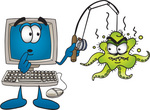We charge $190 to remove a virus in your machine – in order to avoid this cost, you need to follow the steps outlined below which will significantly minimise your chances of getting a virus.
How to Avoid a Virus or Malware Infection
When surfing the net or downloading to your computer pay attention to what our computer is asking you. You should not just automatically click on OK all the time. Lots of viruses are disguised as updates/codecs. When you are surfing on the net and you get a request to update flash/java or something similar to this that doesn’t look quite right, don’t automatically download it as it is probably some form of malware. Updates should come through the notification area at the bottom right of your screen and not through a browser window – so be very careful when updating programs and downloading from the web.
Many browsers can be set to warn you about potential viruses, ensure that your browser has this option activated.
In order to avoid any security vulnerabilities make sure that you have windows update running and also that you have Java and flash updating automatically.
Regarding your emails – don’t click on an attachment or link unless you know the person sending you the email. If you are not sure about an email attachment/link send a return email to check that you know the sender.
Disable image previews is you are using an email-retrieving program as they can automatically load attachments which could be spam.
Make sure that you have a good anti-virus program on your machine. Also install an anti-spyware program as these can pick-up programs that the anti-virus program may overlook. We strongly recommend that you run your virus and spyware programs on a weekly basis.
Be careful of emails coming from companies that you may do business with – dodgy emails like this usually as you for sensitive data such as bank account numbers. These emails mimic real companies but with close inspection of the email and the businesses actual website you can often spot the difference.
Ensure that all anti-virus and anti-spyware programs are up to date. You will need to regularly update these programs in order to allow for new viruses that are being written all the time.
Keep an eye on files with a double extension such as .txt.vb or .jpg.exe. Windows, as a default setting, often hides common file extensions. If this is the case make the file extensions visible by selecting Folder Options in the Control Panel – it also may be under Appearance or Pesonalisation. Under the View tab make sure that Hide Extensions for Known File Types is not selected.
Be careful when allowing somebody to assist you remotely as if their computer is infected it ill likely infect you too.
Finally remember to back up regularly, this may save your work and valuable files should you get a particularly malicious virus on your machine.
There is a second article you may also wish to read which provides more tips on how to avoid picking up a virus.
Remember if you do pick up a virus, we are always here to help you by removing the virus from your machine, call us on 3397 1215.
Affordable Computer Repairs and Service, based in the inner Brisbane suburb of Coorparoo
